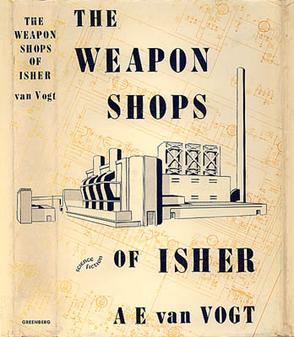For quite a
while, I wondered exactly why people ripped on A. E. van Vogt. Even
after reading criticisms of him, particularly from noted science fiction grand
master Damon Knight, who seemed to lead the charge, I was curious. For the
longest time, I put off reading any of A. E. van Vogt's stories, until I read
praise of him by one of my favorite authors, Philip K. Dick, who said A. E. van
Vogt was one of his biggest inspirations. After reading that, I felt like I had
to check him out. All I had was short stories, so I looked to what was
apparently one of his best shorts (which was, along with two other short stories, turned into a novel), one with a cool concept even (title explains
itself), and dug right in.
And I
figured out fairly quickly why A. E. van Vogt is often criticized.
In my
introduction post, I noted the differences between science fiction and fantasy,
and that they can mix. I don't always mind if they do, but in this story (among
others by Vogt), there seemed to be no rhyme or reason half of the time. Even
the fantastical elements that did make any sense could've easily been fixed up
to seem more realistic. For instance, the door to the weapon shop can somehow
detect when someone has hostile intentions toward the shop owner and won't
allow them inside. How this can be done is not explained or pondered upon in
any way; it just is what it is. Instead, what Vogt could've done was simply
some inner soul searching about the hypocrisy of a man who criticizes a store
for potentially spreading violence through weaponry utilizing one of those
weapons for that very purpose: to attack the shopkeeper, the seller of the
weapons.
Even if
we're not going for the complex psychological profile route, there are still
some simple little things that could've been changed. For instance, instead of
simply showing a video captured by spies to the protagonist about the corrupt
government, Vogt chose to have the protagonist experience some whacked out
little trip, via whatever, through the palace itself without being seen. It was
like the main character suddenly tripped out on acid without even realizing it
and was quickly cured of his ailments after learning what he needed to know.
Which
brings me to a man who often wrote about acid trips and the like, Philip K.
Dick. Despite my criticisms of Vogt, I can see why Dick was inspired by him.
However, unlike Vogt, Dick is a great storyteller. Even with his flaws, whether
it be character flaws (particularly female characters) or his writing style, he
was still able to jot down a competent and interesting story. Even in his more
fantastical elements, he had a cause laid out for everyone. So ultimately, even
if you like Philip K. Dick, I cannot guarantee that you will like A. E. van
Vogt. In fact, unless you like terrible fantasy stories, I doubt you will.
As for this
story itself, it's ultimately about what I figured it might be about: Second
Amendment rights and authoritarianism and freedom and blah blah blah. Even if
you happen to agree with that kind of thing, that doesn't mean you'll like it,
but if you do agree with that stuff, I suggest Robert A. Heinlein to you, and
to avoid this story and A. E. van Vogt in general.
Additional
super fun fact: A. E. van Vogt was a big time Scientologist who even opened up
his own centers. That, to me, further puts his storytelling prowess into focus.

No comments:
Post a Comment